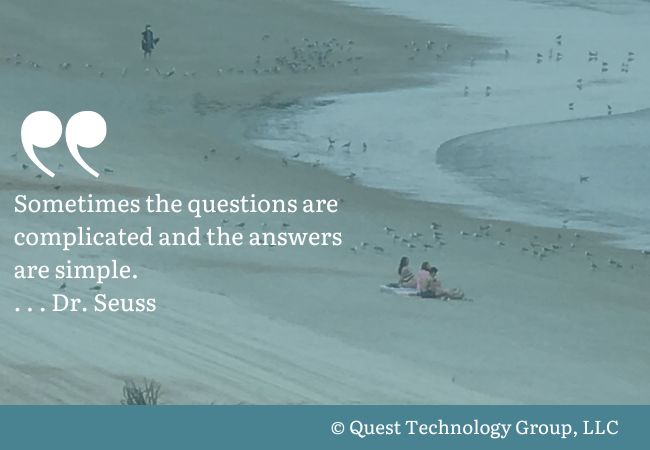How to Start a Technology Framework Discovery

As I wrapped up my laps around the neighborhood Saturday, I stopped to catch up with my across the street neighbor "Steve". After 20 years, our typical conversations revolve around the infrequent home sales, lawn service companies, and messy oak trees that refuse to hang onto their leaves.
But this conversation was different.
Driveway Listening
"Steve" has a C-level seat with a national company that is rapidly expanding through acquisitions. Frustration with their technology team and concerns about their Frankenstein infrastructure were weighing heavily on him.
As I listened to Steve, it was clear he wanted a sanity check.
Humble Words
What he said several times was "We don't know what we don't know".
That's a very hard thing for most of us to say out loud. And yet it's one of the most transformative steps in practical problem-solving.
Think Like an Algebra Word Problem
I offered our help, starting with this single exercise -- create a where-are-they-now picture. Then use it as the visual roadmap for their technology infrastructure decision-making.
For now, let's just draw the blueprint.
Don't worry about what's next.
It was his reaction to that last sentence that was completely unexpected. When Steve heard that he didn't have to think about what to do next, he visibly exhaled and relaxed. Shoulders came down. It was a thing of beauty.
I didn't see that coming at all.
We all promise ourselves that we'll take one step at a time. But our non-stop, get-it-done-now brains aren't on board. We continue to feed our overwhelm and add to the stressful to do list.
It's time to stop this mental madness.
Remember those horrifying word problems we all suffered through in algebra class? When we learned to slow down and put each word into context, the problems became solvable – well, at least most of the time anyway.
Takeaways
One Final Thought
Thinking back over the conversation, I realized one thing I never heard Steve say was, “We're doing it this way.” Period. End of discussion. Instead he asked, “We’re doing this. Is this the right thing to do?
That's one of those complicated question that leads to simple answers.
Thanks for Visiting Us on Wednesday
You're in business to grow and deliver what your customers and clients want most from you.
You've come to the right place.
Join our community of curious learners and business leaders. We talk information, knowledge, tools, and resources to help you and your business thrive.
. . .
 Linda Rolf is a lifelong curious learner who believes a knowledge-first approach builds valuable client relationships.
Linda Rolf is a lifelong curious learner who believes a knowledge-first approach builds valuable client relationships. She is fueled by discovering the unexpected connections among technology, data, information, people and process. For more than four decades, Linda and Quest Technology Group have been their clients' trusted advisor and strategic partner.
Linda believes that lasting value and trust are created through continuously listening, sharing knowledge freely, and delivering more than their clients even know they need.
As the CIO of their first startup client said, "The value that Quest brings to Cotton States is far greater than the software they develop."
Tags: Technology Strategy
